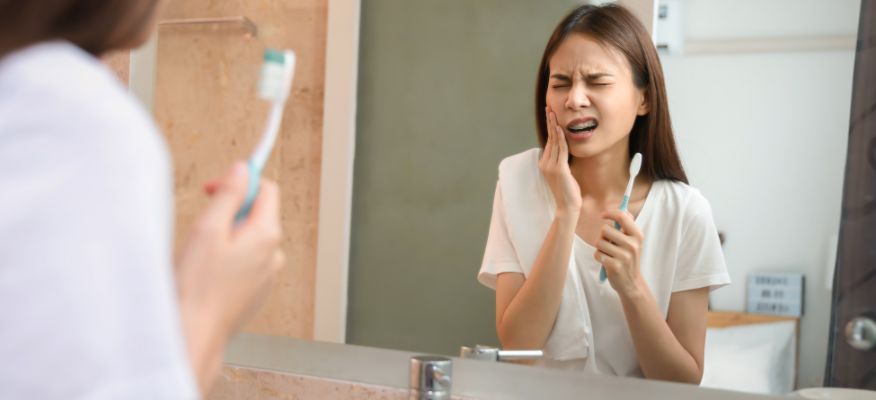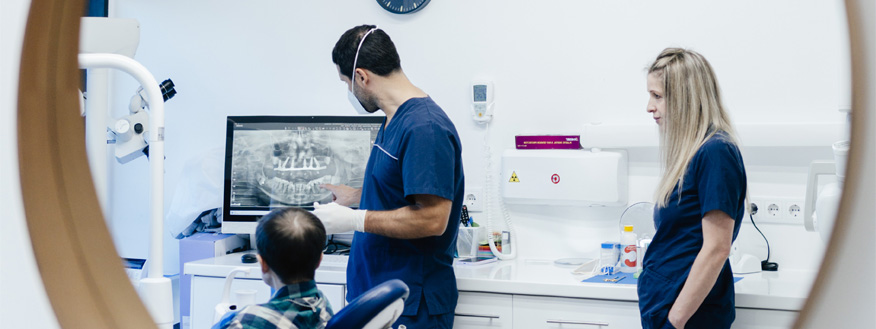
Have you ever felt pain and/or discomfort in your teeth when you eat or drink cold or hot food? Then you may suffer from tooth sensitivity.
What is dental sensitivity?
Dental sensitivity is a very common oral health problem that can affect anyone, but it mainly affects people between the ages of 20 and 50. It can manifest itself sporadically or continuously, appearing predominantly as an acute, short-lived and momentary pain.
How does the pain associated with tooth sensitivity arise?
To answer this question, it’s important to remember that the tooth is made up of 3 layers:
- enamel, which is the hard outermost layer that protects and covers the tooth;
- dentin, the soft innermost layer that protects the tooth’s nerve;
- and dental pulp, the layer in the centre of the tooth where the nerves and blood vessels are located.
The pain associated with tooth sensitivity arises when the dentin is exposed, which in turn has several very thin tubes, called tubules, that connect the nerve (in the centre of the tooth) to the external environment.
So when these tubules are unprotected and receive certain stimuli, the nerves are affected and react by causing pain.
The stimuli responsible for discomfort are typically thermal (cold and/or hot), mechanical/tactile (e.g. the action of the toothbrush) and even chemical (sweets and acids).

What are the causes of dental sensitivity?
Tooth sensitivity occurs, as we have seen, when dentin is exposed. This exposure can happen for two main reasons:
- wear of the enamel (hard tissue that protects the inside of the tooth)
- or gum recession (which can expose the root and, consequently, the dentin).
There are also other factors that can cause dentin exposure:
- Incorrect brushing: Brushing your teeth too hard, too often or using a brush that is too firm can risk wearing down tooth enamel and causing gum recession, increasing the possibility of dentin exposure.
- Gum Diseases: Gum diseases, such as Gingivitis and Periodontitis, are manifested by inflammation of the gum tissues which can lead to gum recession, exposing tooth roots and causing tooth sensitivity.
- Plaque and Tartar: The presence of plaque and tartar around the tooth and near the gum causes inflammation of the gum tissues. If this inflammation worsens, it can cause bone loss and gum recession, which will consequently expose the dentin.
-
Abrasive toothpastes: Toothpastes that are too abrasive, such as some whitening toothpastes, are aggressive towards tooth enamel, wearing it down and exposing the tooth to external aggressions.
-
Elixirs: Excessive use of certain types of elixirs (acidic and with alcohols) can aggravate tooth sensitivity.
-
Caries lesions: Deeper and more advanced caries can affect the dentin, increasing tooth sensitivity.
-
Acidic or sugary foods and/or drinks: Foods with a high acidic or sugary content can cause the tooth enamel to wear away through an erosion process. For this reason, it is not recommended that you brush your teeth immediately after a meal, as the toothpaste together with the acids in the food will attack the tooth enamel, weakening it.
- Broken teeth and/or damaged rehabilitations: In addition to the expected sensitivity due to the greater exposure of the root and/or dentin, this can be a site of greater bacterial accumulation and, consequently, cause inflammation of the gum tissues and tooth pulp, causing a greater sensation of pain and discomfort.
- Recent dental treatments: Some treatments can be expected to cause temporary tooth sensitivity, such as tooth whitening, deep fillings and/or root canalisation.
- Bruxism: Bruxism is characterised by an involuntary clenching and grinding of the teeth, which leads to wear of the enamel, exposing the dentin and consequently increasing tooth sensitivity.

